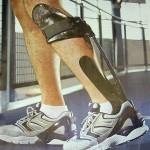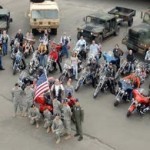Tracey Cramer-Kelly's Blog, page 25
July 25, 2012
Veterans with PTSD Fueling the Study of Nightmares
 Seems the influx of veterans experiencing nightmares is fueling research in the area of dream studies. One study cited in a Time magazine article showed more than 70% of veterans with PTSD symptoms reported trouble sleeping. And I love this statement of the obvious: “since treating people who are constantly tired is pointless, gaining a better understanding of sleep and dreams became a priority.”
Seems the influx of veterans experiencing nightmares is fueling research in the area of dream studies. One study cited in a Time magazine article showed more than 70% of veterans with PTSD symptoms reported trouble sleeping. And I love this statement of the obvious: “since treating people who are constantly tired is pointless, gaining a better understanding of sleep and dreams became a priority.”
Here’s an interesting statistic: In 1996 there were 337 facilities accredited by the American Academy of Sleep Medicine; today there are over 2000.
First approach: it’s psychological. Treatment: Imagery Rehearsal Therapy (IRT). How it works: start by imaging a dream you would LIKE to have. Write that one down, and every day, take a few minutes (preferably with eyes closed) to think about that dream.
Does it work? The study cited in this article indicated “remarkable results.” Of soldiers with PTSD, 40% reported fewer symptoms such as shame and numbness.
Second approach: it’s physiological. Specifically, it’s about breathing. Some studies indicate up to 90% of patients with persistent nightmares had either sleep apnea (a disorder in which breathing pauses while you sleep) or a milder form called upper-airway-resistance syndrome.
Typical therapy for this is the CPAP machine (pushes air into your mouth), although waking with a tube stuck to one’s face doesn’t have much appeal. There are stimulant medications (to keep one from napping during the day)… AND Ambien-type drugs to get to sleep. (Does anyone else see something wrong with this picture??)
Interesting asides: Did you know there is such a thing as a Warfighter Sleep Kit? (Veterans, let me know, will you?). Apparently it contains a DVD, camouflage mask and earplugs. And then there’s the DreamLight, which sits over your eyes and flashes white lights when your eyes begin moving in a REM pattern. The idea behind this one is “Lucid Dreaming,” where you “take control” of your dreams.
Personally, I think this is good news. The more options there are, the more likely the individual suffering through nightmares will find something that works for him/her. Just be sure to consider all sides/therapies, because at this time, sleep doctors aren’t trained in psychology, and psychologists don’t have medical training.
July 22, 2012
Exploring Gold Rush Ghost Towns in California’s Sierra Nevada
 Hubby and I just returned from a trip to California, where we spent three phone- and internet-free days rafting the Tuolumne River, with an extra day and a half for our ghost-town hunting hobby. Since the rafting photos aren’t ready yet, I’ll blog first about the ghost towns, both of which are in the Sierra Nevada foothills.
Hubby and I just returned from a trip to California, where we spent three phone- and internet-free days rafting the Tuolumne River, with an extra day and a half for our ghost-town hunting hobby. Since the rafting photos aren’t ready yet, I’ll blog first about the ghost towns, both of which are in the Sierra Nevada foothills.
The story of Columbia, California starts with a couple ordinary guys who camped in a meadow and happened to get caught in one of the area’s rare rain showers. They decided to pan a small stream while they waited for their clothing and belongings to dry. They immediately found gold, and the rush was on.
Much of the town’s history has to do with lack of water and fire, but I won’t go into all that. (Here’s info about the annual re-enactment as well as park information.)
What’s unique about Columbia, California, today is that the state has protected the area (as a state park) and funded restoration projects. Today, small, unique businesses rent out the old storefronts (I especially liked the old-fashioned candy store!), the Wells Fargo building still has a stagecoach, and the Fallon House still rents rooms and is the home of a lively theatre company. The town is truly “stuck” in the 1850s – and I am impressed that the state of California has supported this old gold rush town.
Volcano, California, was more of a “true” ghost town, as evidenced by the smattering of completely fallen-in buildings. The highlight of our visit to Volcano was the old (unoccupied and in-need-of-repair) hotel; a sign on the door was a “Notice of Change of Ownership” (no, we didn’t trespass!) It made me curious, so I googled it upon my return. Turns out the St. George Hotel has a history of paranormal (ghost) activity. Fascinating! Wonder what the new owners will do with it. There is a cavern/cave offering tours only a few miles from the town, so who knows? It could work. At any rate, it was great fodder for my creative writer mind.
To see photos of Columbia and Volcano, click here (you will need to “fan” my Facebook page).
July 13, 2012
Things I Won’t Miss When I’m on the River
In just a couple days, I will be on a river in the middle of nowhere. No phone. No internet. No TV. No kids.
I can’t wait. For one thing, it’s the first summer vacation I’ve taken in twelve years. But most important, I will be completely “unplugged.” Here’s a few things I WON’T miss while I’m on the river.
Blue Lights. That includes all computer screens (I’m doing it right now!), TV screens and even my smart phone screen.
Deadlines. I’ve got a crazy schedule sometimes. Work. Kids. Spouse. Writing. There are never enough hours in the day. But for these few days on the river, I just won’t care! I’ll live a life of simplicity. Eat. Paddle. Eat again. Watch flames in a campfire. Count stars instead of streetlights…
Bills. Some people love to shop. Not me. My idea of a true vacation doesn’t require me to be chained to my wallet. One of the brilliant aspects of a river trip is that there’s nothing to spend money on. In fact, we’re encouraged to leave it behind!
The Nemesis. We’ve all got them – the people who get under our skin. People who block our happiness or success. On the river, though, that memory will fade until it’s gone.
Chores. Ah, the never-ending gets a reprieve. I’m looking forward to guides who are eager to do things for me (like cooking gourmet meals!). That want me to relax by the fire as they clean up afterward!
So don’t email me next week. Don’t call me. I’ll be incommunicado!
July 9, 2012
Writing an Older Heroine (Book Review)
If you ever get tired of the typical romance heroines – or just need a break from them – this book is a refreshing change. The heroine is a middle-aged woman, and she is FUNNY. She is plain spoken, full of character quirks (foibles?), and makes gentle fun of herself. Her insecurities often revolve around her “older” body, but even then she does what she wants. Even her jargon makes her come to life.
And her interactions with the hero (who is a middle-aged cop) had me laughing out loud… especially the way the author handled the sex scene. (That’s all I’ll say so as not to ruin it for anyone!)
Of course, as a writer myself, I got even more chuckles out of the storyline, which involves not one but TWO author murders, all during one long weekend at a writers conference. I chuckled my way through this one!
July 5, 2012
New Leg Brace for Wounded Veterans Has Amazing Success Rate
 Aaron Bricewick, hero of True Surrender, returns from war in Afghanistan an amputee. When I was writing scenes (in 2010) related to his amputation and fake leg, there had already been great advances in prosthetic limbs (largely due to the higher numbers of wounded veterans).
Aaron Bricewick, hero of True Surrender, returns from war in Afghanistan an amputee. When I was writing scenes (in 2010) related to his amputation and fake leg, there had already been great advances in prosthetic limbs (largely due to the higher numbers of wounded veterans).
Today, there are an estimated five or six limb-salvage patients for every amputee from the Iraq and Afghanistan wars. (Meaning they have not had an amputation.)
But in a strange twist, soldiers have been asking FOR amputations (months or even years after the injury) because limb rehab is so difficult, and requires so many surgeries, for what is still a questionable outcome (many soldiers who’ve kept their wounded legs still cannot walk without pain, let alone run or do more demanding physical activity). With an amputation, they can be fitted for a modern prosthesis and get much more function than the “dead” limb was otherwise achieving.
So I read with interest a recent article (Time magazine) about a new brace called an IDEO, or Intrepid Dynamic Exoskeletal Orthosis. This special brace fits into the person’s shoe and runs a carbon-fiber strut up the calf to a cuff that attaches just below the knee, acting as a cheetah-like springboard for an ankle that can’t flex and muscles that no longer exist.
It has an amazing success rate – and I was surprised how quickly the success could be achieved (in some cases, patients who could hardly walk were running and jumping within a week of being fitted). In fact, nearly half the participants have asked for and been granted a return to duty – and those duties include very physically demanding jobs in Special Forces and Navy Seals.
I think this is one to keep watch on!
June 29, 2012
Military Veteran Suicides: Eighteen a Day
 True Surrender is the story of Aaron Bricewick, an Army officer who returns from duty in Afghanistan with one less leg and struggling with PTSD. Although he is forced to confront lots of scary things (including himself), he ultimately triumphs over his struggles.
True Surrender is the story of Aaron Bricewick, an Army officer who returns from duty in Afghanistan with one less leg and struggling with PTSD. Although he is forced to confront lots of scary things (including himself), he ultimately triumphs over his struggles.
True Surrender has a happy ending.
In real life, however, all too often the ending is not happy. A recent Newsweek article says that 18 veterans kill themselves every day. Every day! In fact, “the number of U.S. soldiers who have died by their own hand is now estimated to be greater than the number (6460) who have died in combat in Afghanistan and Iraq.”
To me, public support for soldiers seems high. There are numerous programs, non-profits, etc dedicated to veterans’ well-being. I’ve “fanned” many of them on Facebook (fan me to connect to them).
There are sites like Make the Connection (a program of the VA) and Army Strong Stories that show real veterans talking about real problems and where and how to find help (and emphasizing that it’s not a weakness to need help). There are organizations dedicated to military spouses, and family program like Fisher House.
I know from being a biker chick that there are numerous patriotic rides and organizations like Tribute to the Troops and Patriot Guard.
XSports4Vets and other “extreme sport” organizations combine high-adrenalin activities with the camaraderie of brothers in arms. (President Bush took part in a veterans dirt bike event.) There’s even a farm in TX just for vets.
Medical advances have given veterans who would have been sidelined for life new legs, arms and more. Alternative therapies have cropped up, along with creative arts-type programs to help veterans process their experiences (for example, making films or writing).
So why are returning soldiers having such a hard time? Why do they continue to feel as though nobody understands them? Why are they surviving the intense trauma of battle only to commit suicide once back in the civilian world? Is it the longer deployments? Is it a different way of fighting? Or are these programs only reaching a small percentage of them?
It just feels like it doesn’t have to be this way…
June 14, 2012
First Responders Fiction/Romance Felt “Distant”
Honor Redeemed is Book 2 in Loree Lough’s First Responder series. The first book (From Ashes to Honor) ended rather abruptly – and with NO happy ending for the hero and heroine. (See previous post.)
So imagine my surprise when, not a dozen pages into THIS book, those characters show up … happily engaged! So, what’s the story there?! Yeah, THAT would have been the story romance readers wanted.
So romance readers, beware … no happy ending in this book, either. I just could NOT get into the female character. She was her own worst enemy when it came to inter-personal issues. That doesn’t usually kill a character for me, but after several instances where the author seemed to lead up to a “breakout” moment for her… but no… it got so dragged-out I almost quit reading.
The male hero (Matt) was just too good to be true. Even at the end he was going to wait around for her. What a waste!
I also figured out what element I was missing in both these books: the “first responder” part of these characters’ lives are ten years in the past. In both books, the characters (hero in particular) have already worked through some nasty fall-out related to 9/11. It’s THAT story I was looking for by picking up this series. I was also looking for more search-and-rescue action (since my novel Last Chance Rescue features search-and-rescue team members).
From the looks of the teaser for Book 3, it will be more of the same; this time I’ll have to pass. Rating: 3-.
June 6, 2012
Filmmaking as Therapy for Wounded Soldiers with PTSD
Having recently completed my first video – and become aware of the power in it – I found the concept of filmmaking as therapy for PTSD interesting.
With a growing demand for ways to treat the psychological damage of war, one Army pilot project is encouraging soldiers to take control of their own stories in a filmmaking class titled “I Was There Media Workshop.”
The Fort Carson program began last year. Twenty veterans of the Iraq and Afghanistan wars have attempted to organize their combat experiences in video as a way to fight PTSD. The classes supplement more-established therapy programs for returning veterans, and the goal is to encourage soldiers to “take control of the things that happened in the past and paint that in a specific way that makes sense.”
An associated press article cites one soldier who made a film “From Hero to Zero” as a way for him to cope with what he describes as a letdown feeling sparked by his pending return to civilian life — which was brought on by a diagnosis for leukemia. The “Hero” refers to his combat experiences in Iraq. The “Zero” depicts him learning about his leukemia and trying to deal with the end of his military career.
Filmmaking as a way to document or cope with the lasting emotional impact of combat is not a new concept. In Los Angeles, ex-U.S. Marine filmmaker Garrett Anderson is making a documentary film with video from pocket digitial cameras that was captured during the November 2004 battle of Fallujah. The 2010 Academy Award nominated “Restrepo,” by author Sebastian Junger and photographer Tim Hetherington, tells the story of a platoon in combat in Afghanistan and its resulting emotional impact on the soldiers.
June 2, 2012
Writing Prompt Results in 14-year-old Discovering Sexual Attraction
I don’t usually have time to participate in random “writing prompts” but over Memorial Day weekend I was at the lake with no internet, no TV, windy/rainy weather – and my kids had their cousins to keep them occupied!
So in addition to working on my current novel-in-progress, I wrote a submission for a Writers Digest prompt. Who knows, maybe I’ll get a mention! At any rate, I thought I’d post it here for your reading enjoyment. The prompt: in 750 words or less, write a story that MUST begin with “I’ve got to get out of these clothes—fast.”
So here goes…
“I’ve got to get out of these clothes—fast.”
At least, that’s what Charlie thought she’d said aloud.
In reality, her lips were too numb to form words.
In fact, her whole body seemed frozen stiff; all she could do was watch as Trig tugged off her boots and socks, then moved upward to remove her jacket.
Then he lifted her shirt clear over her head.
“What—” Her teeth were chattering so violently she could only get out one word at a time. “Are…you—”
“We need to warm you up.” Trig unzipped her jeans. “Got to get rid of as much wet stuff as we can.” He peeled her jeans down her legs like a banana, until she was standing in just her bra and underpants. He pointed to the sleeping bag. “Get into the bedroll. Now.”
She did as she was told, fumbling with the edges around the zipper. She shuddered to think how long she’d been in the raging water. What if Trig hadn’t shown up?
She listened to the rustling sounds of Trig shedding his own soggy clothing: Vest. Flannel button-up shirt. Undershirt. Then boots, socks, riding chaps and jeans.
Dim light coming through the broken boards of the old shack backlit one of the most magnificent things Charlie had seen in her fourteen years: a nearly-naked Trig.
He stood ramrod straight, clad in nothing but his briefs. His attention was focused out the shack’s single tiny window, which allowed Charlie to take in every inch of him: the shadow of a beard and his hair curled at the nape of his neck. The broad shoulders that folded into work-honed biceps. A spray of dark chest hairs across strong pectorals and down a taut stomach until it disappeared under the band of his briefs…
Despite her frozen state, an unfamiliar heat formed between her legs as her eyes wandered over Trig’s well-proportioned rear.
And then he turned toward her.
She feigned sleep, mumbling and shifting in the sleeping bag. Her face burned so hot she thought for sure Trig could see it and know what she was thinking.
He crawled into the sleeping bag behind her and zipped it up as best he could.
“You’re shaking like crazy,” he said, and pulled her fast against his body.
It was true Charlie was shivering uncontrollably, but it wasn’t just because of the cold. The feel of Trig’s body pressed against hers…the way his breath tickled her ear…it was almost as difficult to inhale as it had been with the icy river squeezing the breath from her.
Trig had been a hero to her from day one.
And though everyone said she was too young to know what love was, now she knew for certain that wasn’t true.
May 29, 2012
9/11 First Responders – a Book Review
I was attracted to the book From Ashes to Honor by Loree Lough for several reasons.
First, I love main characters who are soldiers and/or EMS-type personnel, and the idea of following “first responders” of the 9/11 crises intrigued me.
Second, since I often create and write the stories of soldiers with PTSD (post traumatic stress disorder), I’m logically attracted to characters in that situation, as was the case in this novel. (Hero Austin was on scene during 9/11 and Heroine Mercy counseled 9/11 survivors; both carry emotional scars from it.)
The premise also attracted me – two people who already share something in their past reconnecting after a number of years. (After all, both True Surrender and Last Chance Rescue have variations of this theme.)
The storyline was good, but not as compelling as I had expected. I found myself wishing for less back-and-forth banter dialogue, keeping the story tighter and moving a bit faster. I would have liked more detailed descriptions of the dramatic things (like a mugging/beating and subsequent recovery) and how that affected the characters. I guess you could say I wanted drama, but what I got was introspection.
The handling of the Christian theme was good, in my opinion. Not overdone, not preachy…it felt like real-world people. The secondary characters were also well done, giving the right amount of interaction to the main characters while not becoming too stereotypical.
I have mixed feelings about the ending. In one way, it was unexpected so it’s memorable. (I don’t care for the “typical” romance formulas; I like more “meat” in my books, but I also like a happy ending when I’m reading for escape.) I can’t help feeling that it was rushed after all the agonizing on the part of the characters throughout the book. It felt like the author needed to wrap up the book quickly, or wanted to get you to buy the next in the series.
Like other reviewers, I was surprised how many typos and grammatical errors I encountered. Simple things like placing an “Austin said” at the end of a quote would have minimized confusion about who was speaking (which happened with regularity), which inevitably interrupted the flow of the story.
Primarily because of the disappointing ending and poor grammar, I’d have to bump this book to a rating of 3.5. But it has plenty to interest those who enjoy main characters with traumatic backgrounds – particularly medical personnel.




